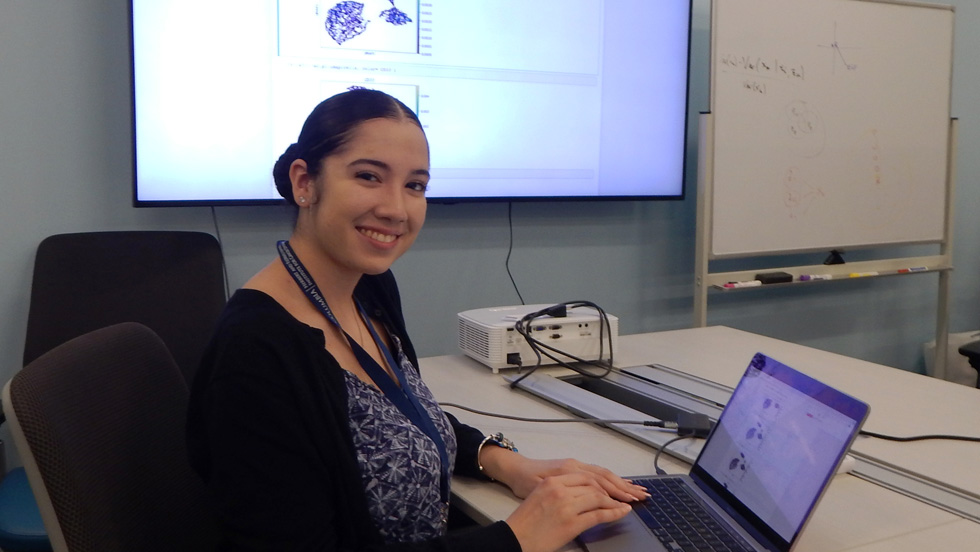
Anabel Ojeda, now a junior, got valuable experience using technology to further the understanding of the behavior of tumor cells at Columbia University's Herbert and Florence Irving Institute for Cancer Dynamics.
After losing her grandmother to a rare form of cancer two years ago, Anabel Ojeda determined to make a difference in the world. “Cancer research is a way for me to give back,” the Queens resident insisted.
As a mathematics major and computer science minor enrolled in Adelphi’s 4+1 program, Ojeda expects to earn her MS in applied mathematics and data science in 2026. This summer, after finishing her sophomore year, she completed a 10-week internship at Columbia University’s Herbert and Florence Irving Institute for Cancer Dynamics, working in its Azizi Lab.
An Adelphi departmental email to math and computer science majors notified her about the internship. “What better opportunity to get straight into what I see myself doing for my future,” she recalled.
Ojeda considers Department of Mathematics and Computer Science assistant professors Anil Venkatesh, PhD, and Nara Yoon, PhD, her mentors. As a high school junior, she took Calculus I from Dr. Venkatesh through Adelphi’s high school Summer Sessions.
She said working on a project with Dr. Yoon that explores drug resistance was her first introduction to cancer research—and a perfect match for her internship. “Both professors encouraged me to apply for the internship and cheered me on to do my best,” she said. “I am super grateful to my mentors.”
Contributing to Research
Columbia professor Elhan Azizi, PhD’s interdisciplinary Azizi Lab develops and applies machine learning techniques and cutting-edge technologies to understand how cells within tumors behave in order to anticipate drug resistance.
While Ojeda’s prerequisites included experience with the Python programming language, she was introduced to the ECHIDNA machine learning algorithm as an intern, which connected whole genome sequencing with single-cell RNA sequencing to analyze how tumor regions evolve in response to treatment.
“I contributed by understanding the model and its data types, in order to help process a new data set,” she recalled. “I learned a lot about gene expression and about applying Python in a way not covered in school. This was also the first time I saw how my field would be applied to biomedical engineering to potentially help—in this case—patients with melanoma.”
A Template for the Future
Ojeda’s summer internship confirmed her desire to pursue cancer research. “I’ll be working with Dr. Yoon again this year and will tell her what I learned to add to our current ongoing project,” she said. After earning her BS and MS degrees, she can see herself working at New York City’s Memorial Sloan Kettering Cancer Center as a data scientist, or even for a company like IBM, where she took data science and design thinking courses through Adelphi’s Innovation Center.
Making Lasting Connections
Ojeda especially appreciates the internship for the opportunities it gave her to work with important figures in cancer research. “I look up to and truly admire Dr. Azizi, who is so dedicated to the field,” she said.
“I made amazing connections who were really helpful—from graduate and PhD students, lab members and the seven other student interns in my cohort who came from different places,” she reported. “I was honored to be one of them and to represent Adelphi.”